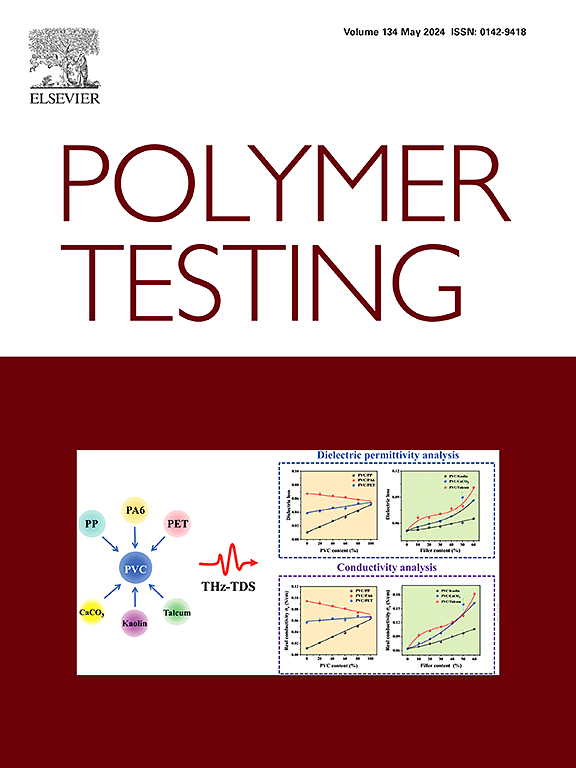Fabrication of advanced polyphenylene sulfide composites by in-situ grafting of sulfide silane and PCPA on glass fibers
IF 5
2区 材料科学
Q1 MATERIALS SCIENCE, CHARACTERIZATION & TESTING
引用次数: 0
Abstract
The energy crisis has driven increased adoption of electric vehicles (EVs) in the automotive sector, with a focus on lightweight engineering plastics (EPs) for fuel efficiency. This study aims to enhance the mechanical properties and thermal conductivity of EPs to address heat-related concerns in EVs and electronic devices. A hybrid filler (milled glass fiber, boron nitride, and graphene oxide) was introduced to polyphenylene sulfide (PPS), using a simultaneous grafting process with poly(catechol/polyamine) (PCPA) and silane additives. Filler aggregation in the resin matrix was overcome with surface-treatment agents such as Bis[3-(triethoxysilyl)propyl] tetrasulfide (Si69), catechol, and tetraethylenepentamine. PCPA polymerization on the filler surfaces bridged connections between fillers and silane molecules. The resulting surface-treated hybrid composite showed a 637 % increase in thermal conductivity (2.102 Wm−1K−1) and a 63.94 % increase in tensile strength (65.87 MPa) compared to the base matrix. Incorporating 40 wt% surface-treated mGF, 30 wt% raw BN, and 6 wt% surface-treated GO, along with PCPA and Si69 treatments, achieved this improvement. The hybrid filler composites significantly enhanced thermal conductivity and mechanical properties, providing a rapid and convenient solution to challenges in robustness and heat dissipation for electronic vehicles and devices.
通过在玻璃纤维上原位接枝硫化硅烷和聚对苯二甲酸乙二醇酯,制造先进的聚苯硫醚复合材料
能源危机促使汽车行业越来越多地采用电动汽车 (EV),重点是轻质工程塑料 (EP),以提高燃油效率。本研究旨在提高 EP 的机械性能和导热性,以解决电动汽车和电子设备中与热有关的问题。利用聚(邻苯二酚/聚胺)(PCPA)和硅烷添加剂同时接枝工艺,在聚苯硫醚(PPS)中引入了混合填料(研磨玻璃纤维、氮化硼和氧化石墨烯)。双[3-(三乙氧基硅基)丙基]四硫化物(Si69)、邻苯二酚和四乙烯五胺等表面处理剂克服了树脂基体中的填料聚集问题。填料表面的 PCPA 聚合在填料和硅烷分子之间架起了桥梁。与基体相比,经过表面处理的混合复合材料的热导率(2.102 Wm-1K-1)提高了 637%,拉伸强度(65.87 兆帕)提高了 63.94%。通过加入 40 wt% 经表面处理的 mGF、30 wt% 未加工 BN 和 6 wt% 经表面处理的 GO 以及 PCPA 和 Si69 处理,实现了上述改进。混合填料复合材料显著提高了导热性和机械性能,为解决电子车辆和设备在坚固性和散热方面的难题提供了快速便捷的解决方案。
本文章由计算机程序翻译,如有差异,请以英文原文为准。
求助全文
约1分钟内获得全文
求助全文
来源期刊

Polymer Testing
工程技术-材料科学:表征与测试
CiteScore
10.70
自引率
5.90%
发文量
328
审稿时长
44 days
期刊介绍:
Polymer Testing focuses on the testing, analysis and characterization of polymer materials, including both synthetic and natural or biobased polymers. Novel testing methods and the testing of novel polymeric materials in bulk, solution and dispersion is covered. In addition, we welcome the submission of the testing of polymeric materials for a wide range of applications and industrial products as well as nanoscale characterization.
The scope includes but is not limited to the following main topics:
Novel testing methods and Chemical analysis
• mechanical, thermal, electrical, chemical, imaging, spectroscopy, scattering and rheology
Physical properties and behaviour of novel polymer systems
• nanoscale properties, morphology, transport properties
Degradation and recycling of polymeric materials when combined with novel testing or characterization methods
• degradation, biodegradation, ageing and fire retardancy
Modelling and Simulation work will be only considered when it is linked to new or previously published experimental results.
 求助内容:
求助内容: 应助结果提醒方式:
应助结果提醒方式:


